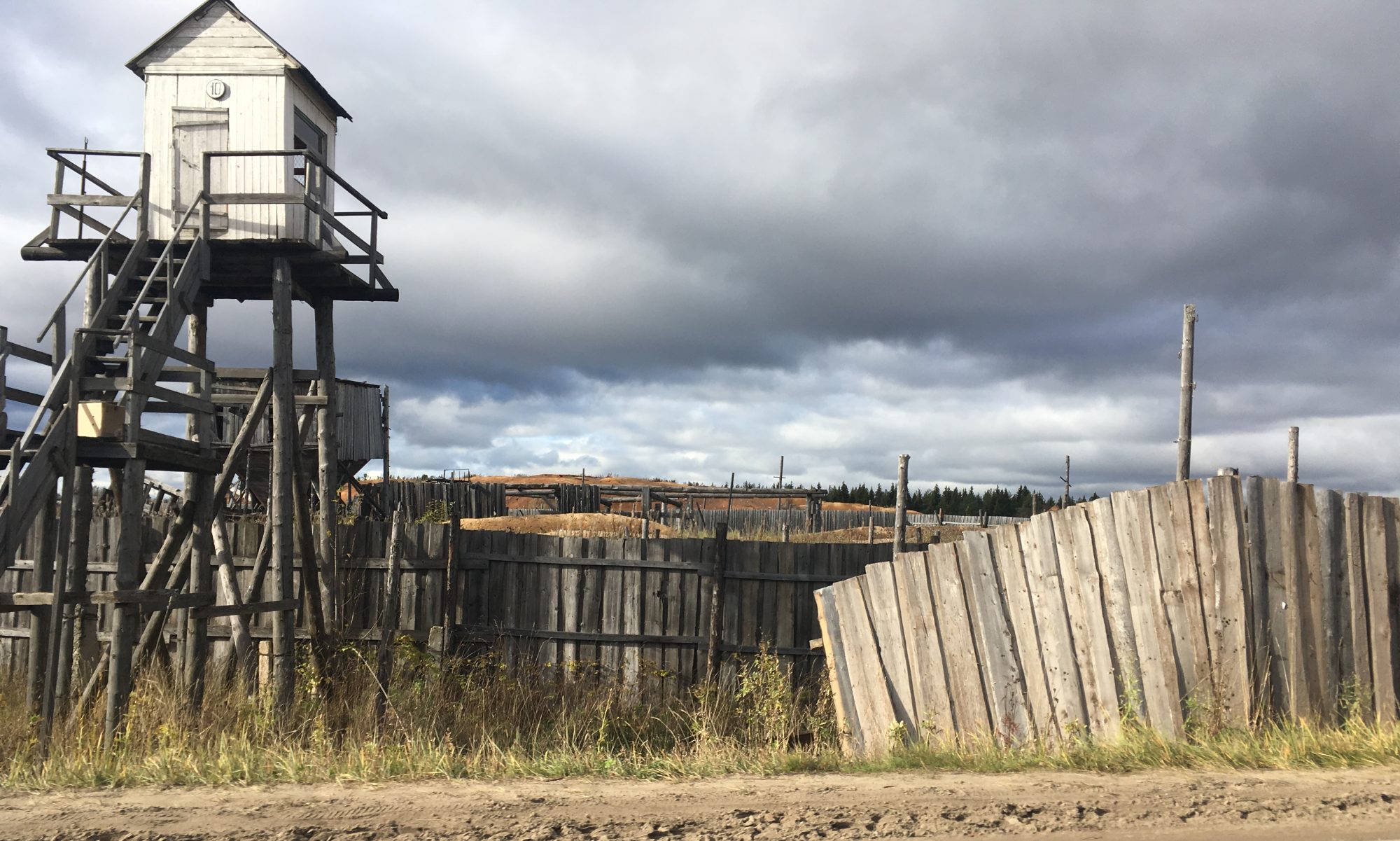Back in September of 2023, post-doctoral researcher Mikhail Nakonechnyi gave a 40-minute speech as part of the Joseph C. Miller Memorial Lecture Series at Bonn University. The speech focused on the unexplored mass death of freed Gulag prisoners on their return from the camps. The speech is also available on Youtube here: https://www.youtube.com/watch?v=iiysR5pRG1M. 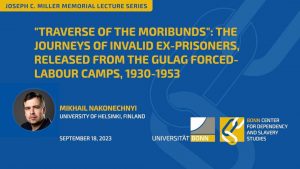
Gulagechoes PI in Berlin to deliver lecture
On June 19th Judith Pallot, PI of Gulagechoes, gave the Richard-Löwenthal Lecture for 2024 at the Institute for East European Studies at the Freie Universität Berlin. In the talk, which was entitled “is there a post-communist prison system?” she was able to present results from the project’s research in Russia, Estonia and Romania. The lecture was introduced by the host Prof. Dr. Katharina Bluhm.
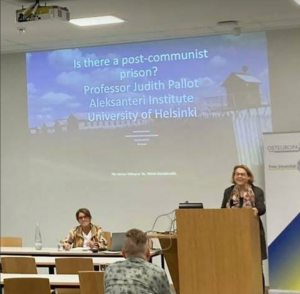
GULAGECHOES film presented at BASEES 2024
BY RYAN REED
On 5 April, 2024 PI Judith Pallot presented the GULAGECHOES film, Wardens’ Gardens, to the BASEES 2024 conference in Cambridge, UK. The film was created in conjunction with team member Dr. Costanza Curro and Dmitry Omelchenko. The full-length film is also available on Youtube.
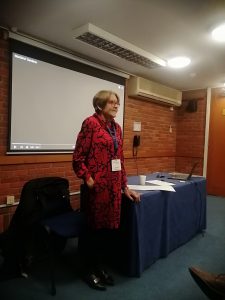
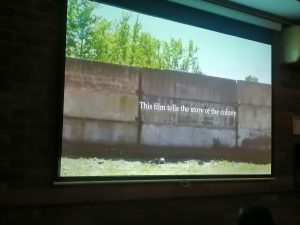
GULAGECHOES Workshop: Christ Church, Oxford, March 25-27
BY RYAN REED, Technical Assistant and Doctoral Researcher
The Gulag Echoes Project Workshop was carried out successfully from March 25th to March 27th at Christ Church, Oxford. The some 40 participants of the workshop were treated to the amenities of Christ Church and Oxford. From breakfast in the Great Hall under the famous sentinel portraits (our PI Judith Pallot included), to an evening reception and dinner at the Ashmolean museum, we hope the workshop’s guests found warmth in our welcome. Accordingly, we must first thank the staff at Christ Church- the Porters Lodge, Duncan for his technical assistance, and the kitchens’ staff. Their help was generous, personal, and prompt the entire way through. Further we would be amiss if we did not thank the organizer of the workshop, Yuliya Brin, for her skill and tact in handling the schedules and desires of two score academics.
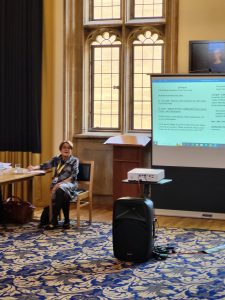
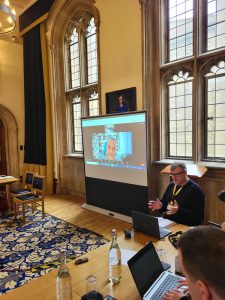
As Judith Pallot stated in her introductory remarks, the breadth of presentations at the workshop demonstrated the tremendous reach the project has had since its start in 2018. This is in terms of topics, disciplines, and the network of researchers connected by the project. Of course, the project and the world have transformed drastically since 2018. The project faced three major challenges- difficulties in cooperation with Russian academic institutions, the COVID19 global pandemic, and Russia’s war of aggression upon Ukraine. Despite these obstacles, the team found new methods, new avenues, and new topics to research.
And so, the workshop brought together this aforementioned network to summarize findings, test theories, and collect constructive feedback as the project enters its final phases and the research and hard work of the Gulag Echoes teams manifests into manuscripts, articles, and other publications. The proceedings were arranged into three sessions dedicated to exploring the historical, sociological, ethnic and cultural underpinnings of the project’s findings. Presenters had 15 minutes to present. For assigned discussants there was 10 minutes to endorse, critique, or expound. What followed was always a lively and fruitful discussion session. Despite the rigorous schedule and complex ideas presented, the workshop’s participants stayed attentive, insightful, and incisive in their comments and questions.
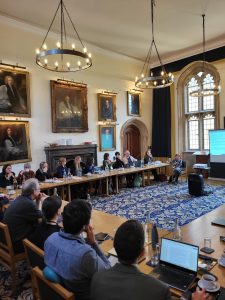
Overall, the workshop brought productive conversations, thought provoking presentations, and a real sense of accomplishment to the members of the Gulag Echoes team. Not only in terms of the ideas and conclusions presented, but also in the network of people in the room who were in some way or another, linked to the project. The Gulag Echoes team is tremendously grateful to all those who shared these few days with us at Christ Church and we look with anticipation to the future blossoming of this nexus of ideas and researchers we have forged over these past six years.
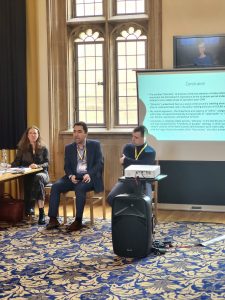
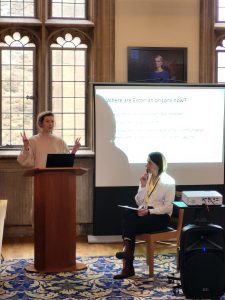
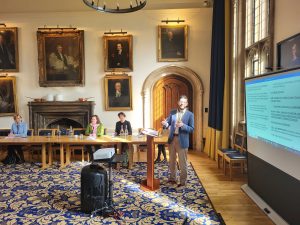
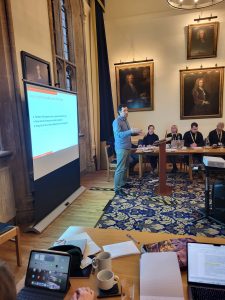
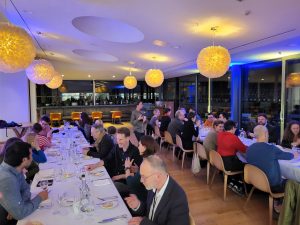
The final schedule of the proceedings:
26th March
7:30-9:00 am Breakfast. Christ Church Hall
10.30 am Assemble and Coffee.
11 – 11.15 am. Welcome and Introduction by Judith Pallot, PI GULAGECHOES
11.15 am – 3.00 pm SESSION I: COMMUNIST PENAL COLLECTIVISM – MYTH OR REALITY?
CHAIR Professor Sarah Badcock, History Department, University of Nottingham.
11.15 am -12.15 pm. Dr Carrie Crockett, (Honorary Fellow, University of Leicester). “Ethnic crossroads within a penal framework: the prisoners of Sakhalin Island, 1868-1905.”
Discussant: Professor Sarah Badcock, History Department, University of Nottingham.
12.15pm – 1.00 pm: Dr Mikhail Nakonenchnyi (Post-doctoral researcher for GULAGECHOES Aleksanteri Institute, University of Helsinki). “Ethnically Blind or Covertly Ethnicized?: Minority Prisoners, Discrimination and Construction of their Ethnicity in the Soviet Penal System, 1921-1991.”
Discussant: Professor Sherzod Muminov, Associate professor in Japanese History, School of History, University of East Anglia.
1pm – 2pm LUNCH Christ Church Hall.
COMMUNIST PENAL COLLECTIVISM” – MYTH OR REALITY? continued
2.00– 2.45 pm Presentation by zoom: Alin Muresan, (PhD candidate, University of Oradea, Romania) “Ethnicity in the Romanian Gulag”
Discussant: Dr Brendan Humphreys, senior post-doctoral researcher for Yugoslavian Penal Nationalism project, Aleksanteri Institute, University of Helsinki.
2.45 – 3.30 pm Dr Nathan Light: (Affiliated Researcher in the department of cultural anthropology and Ethnology, University of Uppsala, Sweden). “Ethics and Ethnicity in the Gulag: a Central Asian victim speaks out.”
Discussant Dr Yury Surochkin, Post-doctoral researcher, GULAGECHOES Aleksanteri Institute, University of Helsinki
3.30 – 5.00 pm SESSION II: DIVERGENT STARTING POINTS AND DIVERGENT PATHS 1989/1991 TO PRESENT
CHAIR: Brendan Humphreys, Aleksanteri Institute, University of Helsinki.
3.30 – 4.00 INTRODUCTION. Dr Gavin Slade, Associate Professor, Department of Sociology, Nazerbayev University, Kazakhstan.
4.00 – 4.30 TEA
4.30 – 5.15 pm. Professor Mykhailo Romanov, (Yaroslavl Mydriy National Law University (Kharkiv) and Aleksanteri Institute, Helsinki University).
Strategy for reforming the penitentiary system of Ukraine: is there one?
Discussant: Professor Laura Piacentini, School of Social Work and Social Policy at the University of Strathclyde, Glasgow.
5.15 – 6.00 pm. Dr Jakub Dràpal, (Faculty of law, Charles University, Prague) Expansive judiciary as a (temporary) solution against penal populism: Case study of Czechia.
Discussant: Dr Barbara Havelkova, Shaw Foundation Fellow in Law, University of Oxford.
6.30 – 7.15 pm. DRINKS RECEPTION: The European Art Gallery, Ashmolean Museum
7.15 – 9.00 pm DINNER: Rooftop Restaurant, the Ashmolean museum.
March 27th
7.30-9.00 am Breakfast. Christ Church Hall
SESSION II: DIVERGENT STARTING POINTS AND DIVERGENT PATHS 1989/1991 TO PRESENT continued
9.30 – 10.15. am. Dr Krešimir Petković (Faculty of Political Science, University of Zagreb). “Is there such a thing as Croatian prison? A brief history of political regime changes and disciplinary power in Croatia”
Discussant: Dr Olga Kantokoski, post-doctoral researcher for Yugoslavian penal nationalism project, Aleksanteri Institute, University of Helsinki
10.15 – 11.00 am. Dr Anna Markina (Researcher, Faculty of Law, University of Tartu, Estonia). “The Estonian prison system: a journey of 30 years”
Discussant: Dr. Olga Zeveleva, Post-doctoral researcher for GULAGECHOES, Aleksanteri Institute, University of Helsinki and from 1st April 2024 Assistant Professor in Conflict Studies, at Utrecht University, the Netherlands
11 – 11.30 am Coffee break
11:30 pm – 5.45pm. SESSION III: THE CARCERAL JOURNEY: ETHNIC AND ETHNO-RELIGIOUS IDENTIFICATION, HIERARCHIES AND EMERGENT INTERMEDIATE STATUSES
CHAIR: Olga Zeveleva, GULAGECHOES.
11.30 – 12.15 pm INTRODUCTION: Ivan Peshkov, (Institute of Eastern Studies, Adam Mickiewicz University Posnan, Poland).
12.15. – 12.45 : Dr Lili di Puppo: (post-doctoral researcher for GULGECHOES, Alexsanteri Institute, University of Helsinki) “Muslims do not submit to anyone except the Almighty”: Staying the same and evading prison categories in Chechen prisoners’ experiences in Russia
Discussant: Dr Igor Mikeshin, University Researcher, Study of Religions Faculty of Arts, University of Helsinki
1.00 pm – 2 pm LUNCH Christ Church Hall
2 .00 – 2.45 pm: Dr Elena Racheva and Professor Federico Varese (University of Oxford). “Criminal governance in Russian prisons”
Discussant: Professor Svetlana Stephenson, School of Sociology, London Metropolitan University, UK.
2.45 – 3.30. Dr Rustam Urinboyev, (Sociology of Law Department, Lund University, Sweden and 2019-2022 post-doctoral researcher for GULAGECHOES) “The Carceral Journey of Uzbek Muslim Prisoners”
Discussant: Dr Agnieszka Kubal, SSEES, University College, University of London, UK.
3.30 – 4 pm TEA
4.00– 4.45 pm: Dr Gabriela Groza, (Independent scholar and psychology expert, associate professor of Babes Bolyai University Cluj-Napoca, Faculty of Psychology and Faculty of Law Cluj-Napoca, Romania) “Who are the inmates who have power in the penitentiary? A study on former inmates of Romanian penitentiaries”.
Discussant: Dr Costanza Curro, GULAGECHOES.
4.45 – 5.30 pm: Film. “Wardens’ Gardens”: The Late Soviet gulag in Georgia
Introduced by Dr Costanza Curro, GULAGECHOES
5.30 Farewell and disperse.
Our Five-Year Anniversary Workshop 26th-27th March 2024, Christ Church, Oxford
From PI Judith Pallot:
Five years ago in early February 2019, we had the launch workshop for my ERC Horizon 2020 GULAGECHOES (no 788448) in the Aleksanteri Institute, the University of Helsinki. It was a great event with participants from Russia, Romania, Kazakhstan, the UK, France, Sweden, and Finland. Very soon after, the contract carefully negotiated over many months between Helsinki and the Higher School of Economics St Peterburg for the Russian leg of the field work was vetoed by Moscow, then COVID-19 struck putting major obstacles in the way of planned fieldwork which included recent permissions for interviews in prisons in all the case study countries. This was then followed by Russia’s unforgiveable war on Ukraine which had, and continues to have, practical impacts on the project and incalculable personal impacts on team members. Despite all of this we have produced results – perhaps not under all the headings we intended – and are looking forward to the project’s final workshop planned for the end of March. That we have results to showcase and have been able to attract some of the leading specialists in post-communist penality to participate in the workshop, is testimony to the commitment to the project and resilience of the GULAGECHOES team of post-doctoral and contracted researchers, some featuring in the picture below and others of whom joined later.
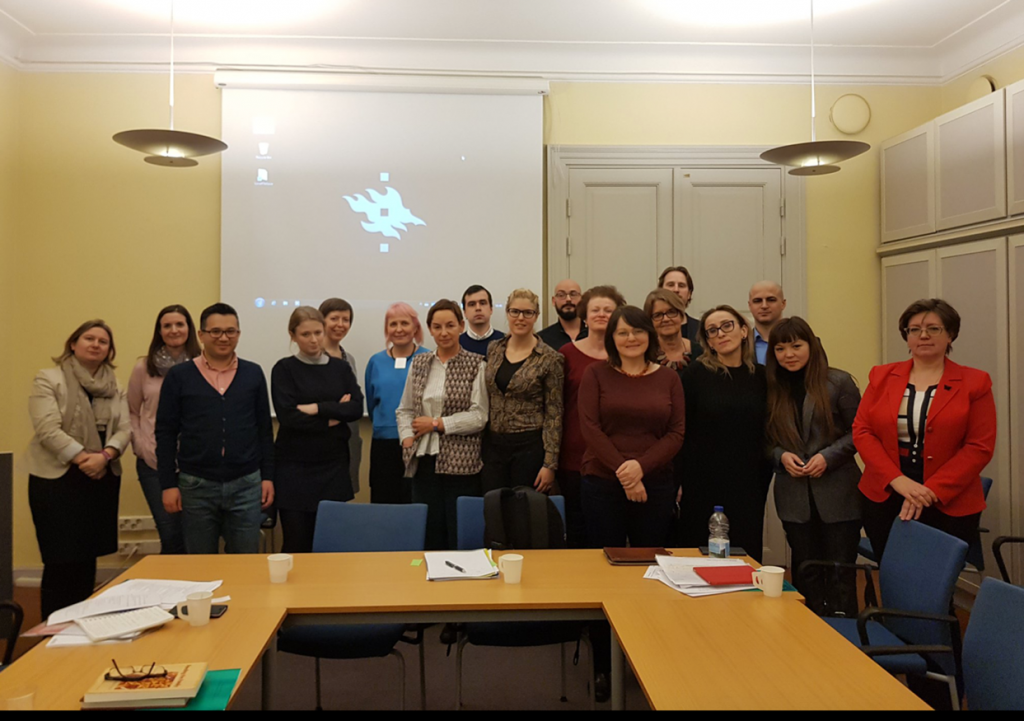
Mikhail Nakonechnyi- Research Visit to the Hoover Institute Library
With archival work in the Russian Federation now off-limits, Mikhail Nakonechnyi has escaped the recent showfall in Helsinki for California. He will spend a month in the archive of the Hoover Institution Library and Archives at Stanford University. We wish safe travels and a successful trip to Mikhail!
Carceral Practices: A Theme at the Aleksanteri Conference, 2023
BY JUDITH PALLOT
In this brief blog piece, PI Judith Pallot highlights the project’s role in the recent Aleksanteri Conference.
The 22nd annual Aleksanteri Institute Conference was held on 25-27th October in Helsinki. Its theme was Decolonising the Global East: legal choices, political transformations, carceral practices. GULAGECHOES and the Academy of Finland, Yugoslavian Penal Nationalism projects were co-sponsors of the conference and members of the research team (Olga Zeveleva, Mihkhail Nakonenchnyi and Brendan Humphreys), on the programme committee. The projects organised two plenary sessions with international participants. The plenary panel “Carceral Practices” discussed the placing of the former communist countries’ prisons in the global penal system. The speakers were Dominique Moran, professor of carceral geography from the UK, Alan Barenberg, leading gulag historian from the USA, Kreshimir Petkovic, specialist on the western Balkans, and Petru Negura, specialist on Moldova. The plenary round table “From Prisons to Organised Crime”, took place in the Think Corner and it brought together two experts with rather different views to debate the role of prison subcultures in the Russian Federation; Gavin Slade from Nazarbayev University, Kazakhstan and Rustam Urinboyev from Lund University, Sweden.
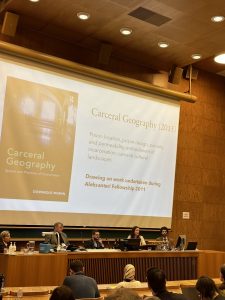
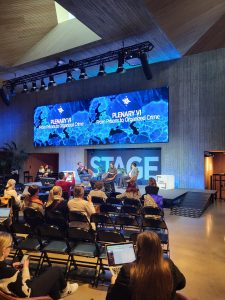
In addition to the two plenary sessions, we organised four other panels on carceral practices with fifteen participants from Finland, Germany, Sweden, the UK, Georgia, USA, Ukraine, Croatia, and Moldova. These examined Carceral Dilemmas in Central Asia and Russia´s Muslim Peripheries; Mythmaking, Terror and Memory in the gulag; Decentering Histories of Carcerality and Penality in the Global East; and Labour, “Life” and Repression in Carceral Spaces in the Global East.
Other penal theme events were organised during the conference. We were fortunate to be able to display an exhibition of prison art from Russia titled, “Attention, Prison! This an exhibition of posters created by incarcerated youth in Russian juvenile colonies based on their personal experience. This exhibition was produced by The Center for the Promotion of Criminal Justice Reform, Russia. It is the oldest human rights organization that works with the issues of incarceration, criminal justice, and the execution of sentences.
Delegates also participated in a workshop on prison art run by Free Translation, a multi-disciplinary project showcasing international works by persons affected by imprisonment.
The conference also was chosen for the premier of the film project of GULAGECHOES. “Wardens’ Gardens” is based on the research of Costanza Curro and Vakhtang Kekoshvili in Khoni, Georgia, and utilizes interviews conducted for the project with former prison officers who worked in correctional colonies in Khoni. The interviewees discuss the specific features of the late Soviet prison system in one of the national republics. The film was followed by a discussion and lively question and answer session led by Dr. Curro.
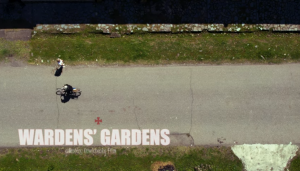
Gulagechoes is now on your Favorite Social Media
Film Premier: Wardens’ Gardens
On 26th of October 2023, the Gulagechoes Project will premier a Dmitry Omelchenko film entitled “Wardens’ Gardens.”

“Wardens’ Garden” is a unique film in which former prison officers reminisce about their work in Khony, Georgia in the last decade of the USSR. The film is inspired by studies of historical memory, its transmission and, in particular, the legacy of the Gulag, aspects of the spread of prison culture throughout the body of the former Soviet Union.
Khony was the location of five correctional labour colonies based on tea plantation that was just one piece of the vast penal monolith run by the Soviet prison system. The film tells the story of Tsulukidze ITK no.46 through the memory of the people who lived in and worked in the colony in the last decade of the Soviet era.
The film will premier on the 26th of October at the Aleksanteri Conference. After the premier, the film will be available on the Gulag Echoes Youtube channel.
The Impact of the War on Ukrainian Prisons, part II update
BY DR. MYKHAILO ROMANOV
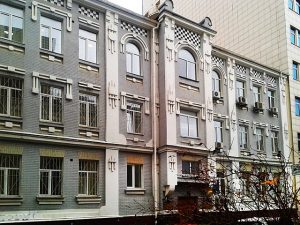
Pechersk District Court in Kyiv, Ukraine.
In Ukraine the arrest of prison officers for extortion is a “small victory for NGOs” reports Mykhailo Romanov in Part II of his blog.
In mid June 2023, an unprecedented event for the post-Soviet penitentiary system has taken place: two former heads of penitentiary institutions have been served with suspicion of committing a number of crimes, including torture of prisoners.
The State Bureau of Investigation (SBI) detained the former head and first deputy head of Berdiansk Correctional Colony No. 77 (CC:77). They are accused of creating a criminal organisation, extortion and torture. The Pechersk District Court of Kyiv imposed a two-month pre-trial restraint on both of them without the right to bail. Human rights activists have been raising the alarm about the situation in the colony since 2008.
“According to operational data, almost everyone who was sent to the colony was a victim of the alleged criminals. Currently, the investigators have collected documentary evidence of abuse of more than 30 victims. According to the SBI website, “The process of identifying the victims of the criminal organization is ongoing.”[1]
The former head of the facility and his first deputy were notified that they were being investigated under part one of Article 255 (creation and management of a criminal organization) of the Criminal Code of Ukraine (as amended by Law No. 671-IX of 04.06.2020), part 2 of Article 127 (torture), part four of Article 189 (extortion) of the Criminal Code of Ukraine.
For five years, the suspects tortured the prisoners, law enforcement officials say: they suffocated them with a wet mattress, beat them with sticks on their heels and buttocks, twisted their arms, and put dirty needles under their fingers.
“At the same time, they extorted money from the victims’ families in return for not subjecting their relative to such torture,” the Prosecutor General’s Office said[2]. He explained that the money was first handed over by the prisoners’ relatives to junior staff who then paid it into the accounts of the senior officers. They also would then withdraw the cash in parcels to the colony. Depending on the financial situation of the family, the criminals demanded different amounts – from 1000 to 100 000 hryvnias (25-2500 Euros)[3].
The detention and serving of suspicion on the heads of penitentiary institutions is in fact an unprecedented event, as the penitentiary system in Ukraine is a rather inert environment that does not accept change but rather hinders any positive changes and reform interventions. The system remainspunitive in nature and still shows no signs of focusing on helping prisoners and their rehabilitation. In the vast majority of cases, all initiated changes in the field of execution of criminal sentences do not reach their intended recipients, are levelled and dissolved in the systemic and informal internal relations that have existed in this area for years.
[1] SBI detains former heads of Berdiansk correctional colony who brutally tortured prisoners to extract money from them (VIDEO) – State Bureau of Investigation (dbr.gov.ua) https://dbr.gov.ua/news/dbr-zatrimalo-kolishnih-kerivnikiv-vipravnoi-kolonii-berdyanska-yaki-zhorstokimi-katuvannyami-vibivali-z-uvyaznenih-groshi
[2] Former heads of Zaporizhzhia penal colony detained for torturing prisoners and extorting money from relatives to stop abuse https://www.gp.gov.ua/ua/posts/katuvali-uvyaznenix-i-vimagali-kosti-vid-ridnix-za-pripinennya-znushhan-zatrimano-kolisnix-kerivnikiv-koloniyi-na-zaporizzi
[3] Business on blood: the leadership of the notorious Berdiansk colony No. 77 was detained https://khpg.org/1608812369
